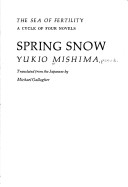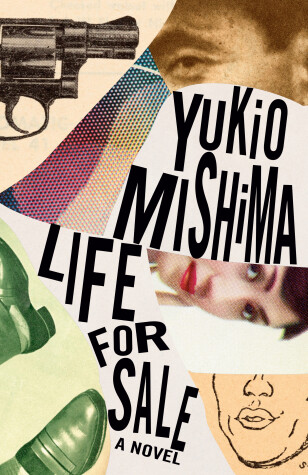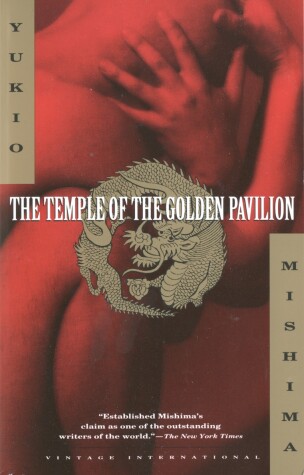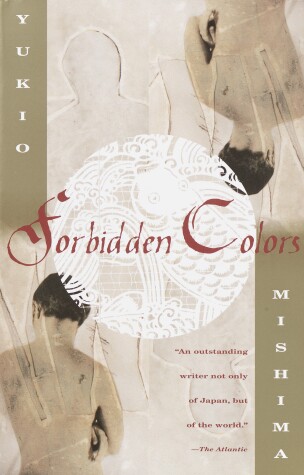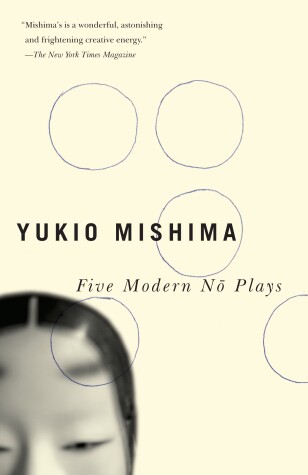Vintage International
5 total works
Yukio Mishima’s Spring Snow is the first novel in his masterful tetralogy, The Sea of Fertility. Here we meet Shigekuni Honda, who narrates this epic tale of what he believes are the successive reincarnations of his friend, Kiyoaki Matsugae.
It is 1912 in Tokyo, and the hermetic world of the ancient aristocracy is being breached for the first time by outsiders — rich provincial families unburdened by tradition, whose money and vitality make them formidable contenders for social and political power. Shigekuni Honda, an aspiring lawyer and his childhood friend, Kiyoaki Matsugae, are the sons of two such families. As they come of age amidst the growing tensions between old and new, Kiyoaki is plagued by his simultaneous love for and loathing of the spirited young woman Ayakura Satoko. But Kiyoaki’s true feelings only become apparent when her sudden engagement to a royal prince shows him the magnitude of his passion — and leads to a love affair both doomed and inevitable.
It is 1912 in Tokyo, and the hermetic world of the ancient aristocracy is being breached for the first time by outsiders — rich provincial families unburdened by tradition, whose money and vitality make them formidable contenders for social and political power. Shigekuni Honda, an aspiring lawyer and his childhood friend, Kiyoaki Matsugae, are the sons of two such families. As they come of age amidst the growing tensions between old and new, Kiyoaki is plagued by his simultaneous love for and loathing of the spirited young woman Ayakura Satoko. But Kiyoaki’s true feelings only become apparent when her sudden engagement to a royal prince shows him the magnitude of his passion — and leads to a love affair both doomed and inevitable.
“A propulsive, madcap story” (The New York Times) about a salaryman who decides to put his life up for sale in the classifieds section of a Tokyo newspaper after a botched suicide attempt. • "An outstanding writer not only of Japan, but of the world." —The Atlantic
After salaryman Hanio Yamada puts his life up for sale, interested parties quickly come calling with increasingly bizarre requests. What follows is a madcap comedy of errors, involving a jealous husband, a drug-addled heiress, poisoned carrots—even a vampire. For someone who just wants to die, Hanio can't seem to catch a break, as he finds himself enmeshed in a continent-wide conspiracy that puts him in the cross hairs of both his own government and a powerful organized-crime syndicate. By turns wildly inventive, darkly comedic, and deeply surreal, in Life for Sale Yukio Mishima stunningly uses satire to explore the same dark themes that preoccupied him throughout his lifetime.
After salaryman Hanio Yamada puts his life up for sale, interested parties quickly come calling with increasingly bizarre requests. What follows is a madcap comedy of errors, involving a jealous husband, a drug-addled heiress, poisoned carrots—even a vampire. For someone who just wants to die, Hanio can't seem to catch a break, as he finds himself enmeshed in a continent-wide conspiracy that puts him in the cross hairs of both his own government and a powerful organized-crime syndicate. By turns wildly inventive, darkly comedic, and deeply surreal, in Life for Sale Yukio Mishima stunningly uses satire to explore the same dark themes that preoccupied him throughout his lifetime.
A haunting portrait of a young man’s obsession with idealized beauty and his destructive quest to possess it fully—and the book that “established Mishima’s claim as one of the outstanding writers of the world" (The New York Times).
Because of the boyhood trauma of seeing his mother make love to another man in the presence of his dying father, Mizoguchi becomes a hopeless stutterer. Taunted by his schoolmates, he feels utterly alone and develops a childhood fascination with Kyoto’s famous Golden Temple. While an acolyte at the temple, he fixates on the structure’s aesthetic perfection and it becomes his one and only object of desire. But as Mizoguchi begins to perceive flaws in the temple, he determines that the only true path to beauty lies in an act of horrific violence. Based on a real incident that occurred in 1950, The Temple of the Golden Pavilion brilliantly portrays the passions and agonies of a young man in postwar Japan, bringing to the subject the erotic imagination and instinct for the dramatic moment that marked Mishima as one of the towering makers of modern fiction.
Because of the boyhood trauma of seeing his mother make love to another man in the presence of his dying father, Mizoguchi becomes a hopeless stutterer. Taunted by his schoolmates, he feels utterly alone and develops a childhood fascination with Kyoto’s famous Golden Temple. While an acolyte at the temple, he fixates on the structure’s aesthetic perfection and it becomes his one and only object of desire. But as Mizoguchi begins to perceive flaws in the temple, he determines that the only true path to beauty lies in an act of horrific violence. Based on a real incident that occurred in 1950, The Temple of the Golden Pavilion brilliantly portrays the passions and agonies of a young man in postwar Japan, bringing to the subject the erotic imagination and instinct for the dramatic moment that marked Mishima as one of the towering makers of modern fiction.
From one of Japan's greatest modern writers comes an exquisitely disturbing novel of sexual combat and concealed passion, a work that distills beauty, longing, and loathing into an intoxicating tale. • “One of the outstanding writers of the world.” —The New York Times
An aging, embittered novelist sets out to avenge himself on the women who have betrayed him. He finds the perfect instrument in Yuichi, a young man whose beauty makes him irresistible to women but who is just discovering his attraction to other men. As Yuichi's mentor presses him into a loveless marriage and a series of equally loveless philanderings, his protégé enters the gay underworld of postwar Japan where Yuichi is defenseless as any of the women he preys upon.
An aging, embittered novelist sets out to avenge himself on the women who have betrayed him. He finds the perfect instrument in Yuichi, a young man whose beauty makes him irresistible to women but who is just discovering his attraction to other men. As Yuichi's mentor presses him into a loveless marriage and a series of equally loveless philanderings, his protégé enters the gay underworld of postwar Japan where Yuichi is defenseless as any of the women he preys upon.
Japanese No drama is one of the great art forms that has fascinated people throughout the world. The late Yukio Mishima, one of Japan's outstanding post-war writers, infused new life into the form by using it for plays that preserve the style and inner spirit of No and are at the same time so modern, so direct, and intelligible that they could, as he suggested, be played on a bench in Central Park. Here are five of his No plays, stunning in their contemporary nature and relevance—and finally made available again for readers to enjoy.
